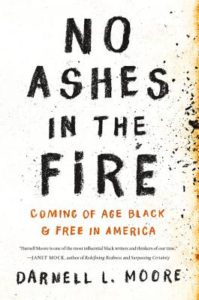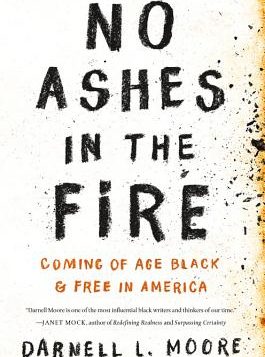 No Ashes in the Fire: Coming of Age
No Ashes in the Fire: Coming of Age
Black and Free in America
by Darnell L. Moore
Nation Books. 256 pages, $26.
BOOKS SHOULD NOT be judged by their covers, of course, but sometimes a cover can telegraph what’s inside. Darnell Moore’s memoir of growing up as a low-income African-American in a society managed by affluent whites is exquisitely conveyed by the charcoal lettering on its white cover. A gay theme does emerge, but the first half of the book is about building a social foundation. Here the deep networks of black life in urban America are laid out as much by example as by description. Moore isn’t telling only one slice of his story. We get all of the complexities of race, sexuality, and human relationships from family to childhood to college graduate.
At first we experience the manhood rituals of boys. Moore’s complex father, who left the family but makes a bizarre reappearance late in the book, showed him how to swim essentially by lowering the boy into eight feet of water and assuming that “the real, definitive boys and men stayed above the water and mastered the element that tried to control them.” To sink, “especially in front of your peers, was sissy shit.” And those peers were a direct-action lot. Thinking teenage Moore was gay, they poured gasoline on him and only a failed match and a vigorous intervention by the pugilistic Aunt Barbara, who happened to be passing by, kept the narrative, and the narrator, alive.
Around the time of Aunt Barbara’s timely arrival, the book starts to include a series of tension-building puppy loves. Most of them are described with just enough detail that a gay male reader will recall similar events in his own childhood: the crushes, the doubts, the sub rosa fondlings, the denials, and slightly “off” relationships with girls. These connections build in importance and richness over the years. Moore’s period of uncertainty and perimeter-building against his homosexuality was relatively long, extending well past his college years. It included a well-intentioned wallowing in old-fashioned religion and some time in a seminary before he emerged from that chrysalis into a mature acceptance of his identity.
Ever perceptive of unspoken truths, he notes when explaining how he came to his quiet faith that “the thirst for power leaves the spirit arid.” In these days of religious lava burning its way through our society and politics, it is a rare privilege, even for a nonbeliever, to read the work of a writer whose spiritual core has clearly been developed through a deep understanding of humanity. In No Ashes in the Fire, we follow this development along with Moore’s maturation as a gay man, as a family member, and as a citizen of our troubled nation. They are all interconnected.
During those transition years he came to recognize that “for many black boys and girls who are attracted to the same sex, black queer life is a life of solitary confinement” owing to the inability to talk about these issues with anyone. The book’s most universal and poignant chapter is called “Touch.” I have never read a better series of expositions of what it actually feels like to cruise, to be touched, to have the experience of man-on-man contact for the first time.
One aspect of this story that the author clearly wants to emphasize is the inherent vulnerability of young black men. With exceptional tenderness he reminds us that for society to recognize their full humanity, “black boys and men would have to be seen … as bleeding, crying, vulnerable and sometimes resilient human persons” and not just as hypersexual masculine brutes valued and feared for their bodies, devoid of emotion. Moore notes with a rather fragile optimism that “Black LGBT people are not the amoral problems deserving of what has been inflicted upon us, nor are we victims who refuse to fight back or who sometimes die while trying. The more precise rendering of the problem is one that exposes both victimizers and an apathetic public that allows bias, violence and hatred to continue under its watch.”
This book is not long. It doesn’t need to be. Late in the story, Moore prepares for a long-postponed coming out to his mother, and the result is two heart-poundingly perfect pages. At one point Moore mentions a loose connection to the poet Essex Hemphill. This serves as a reminder that we have been graced by so much creative energy from black gay Americans in recent decades. Moore’s writing is excellent, well along the way to a place with his great predecessors and contemporaries. His life so far is that of a remarkably perceptive and self-aware writer, and he got there through experiences that we need to hear about to fully appreciate where he is today.
_____________________________________________________________
Alan Contreras is a writer who lives in Eugene, Oregon.






